| Pages:
1
2 |
IndependentBoffin
Hazard to Others
  
Posts: 150
Registered: 15-4-2011
Member Is Offline
Mood: No Mood
|
|
Hi guys,
Please see pictures of a short Zr bar, 4.5kg of swarf (fills a 25kg polybag) and 100 - 150 micron Zr powder attached.
Surprisingly a pile of moist Zr powder is not as flammable compared to swarf.
Early on when I was assessing the safety of handling micronised Zr powder, I brought a blowtorch to the Zr powder and it needs to glow red hot before
a self-sustaining reaction happens (it looks like a bright white spot moving around under a dark pile), although bits which were blown off from the
pile by the blowtorch's airflow and flew into free air burned like bright sparklers.
The swarf however once lit keeps burning like when you light steel wool, only with a more incandescent flame.
I'm sure the Zr powder behaves differently if you put a dry quantity in a container, shake it around to aerosolise it and then ignite it  , but I would prefer not to upset the neighbours , but I would prefer not to upset the neighbours 
I'm buying some heavier digital scales (up to 50kg). I'll then put the short pure Zr billet on the scales with some linear scales so you can roughly
estimate the density by pictures to be 6.52g/cm3, thus providing evidence of the material and the purity.
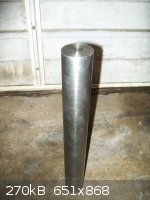 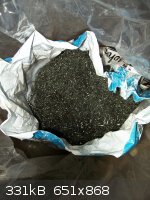 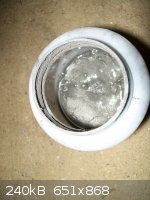
I can sell the following:
1) Various high purity non-ferrous metals - Ni, Co, Ta, Zr, Mo, Ti, Nb.
2) Alkex para-aramid Korean Kevlar analogue fabric (about 50% Du Pont's prices)
3) NdFeB magnets
4) High purity technical ceramics
|
|
|
The WiZard is In
International Hazard
    
Posts: 1617
Registered: 3-4-2010
Member Is Offline
Mood: No Mood
|
|
Quote: Originally posted by IndependentBoffin  | One of the board members wants to buy 10g of swarf. Here's what 10g looks like.
If you burn a filament of the zirconium swarf you will see it burns slowly with a white hot flame, producing little smoke unlike magnesium or
aluminium which produces white vapours of the oxide in the gas phase.
|
Speaking of Smokeless
This from Bennett I 1933, P. 392
Smokeless Flashlight Powder
Zirconium 28 pts.
Zr hydride 7
Magnesium 7
Barium nitrate 30
Barium oxide 25
Rice starch 5
Sorry to say - Bennett does not supply the original
source.
---------
Industrial and manufacturing chemistry: organic, a practical treatise
By Geoffrey Martin
1913
3. Smokeless flashlight mixtures giving an intense light consist of magnesium or aluminium
powder + nitrates of rare earths (thorium, zirconium). See German Patent, 158,215; see also
English Patent, 27,267 (1904), where rare earths are added to Mg or Al flashlights. \
-------
Two parts of magnesium or aluminium powder are mixed with two
parts of cerium or thorium nitrate, and with one part of zirconium
nitrate ; the double salt of these nitrates with other nitrates may
also be employed. These flashlights are said to burn with
practically no smoke, giving a flash of great actinic power, and of
much shorter duration than have been prepared with chlorates
peroxides.
Photographic Flashlight Powder. Act-Ges. f. Anilinfabr. Fr. Pat. 340,459, Feb 15, 1904.
In:— The Journal of the Society of Chemical Industry. 16 [23] 836. Aug. 31, 1904.
|
|
|
watson.fawkes
International Hazard
    
Posts: 2793
Registered: 16-8-2008
Member Is Offline
Mood: No Mood
|
|
Reminds me of U. S. Pat. 6848366.
|
|
|
IndependentBoffin
Hazard to Others
  
Posts: 150
Registered: 15-4-2011
Member Is Offline
Mood: No Mood
|
|
Hi guys,
Some of you have PM'ed me asking for small samples of metals I don't have in immediate stock - e.g. Ni, Co, Ta, Mo, Nb. My supplier isn't interested
in small sales the size one might use in a chemical elements collection. The smallest samples they can supply for these are 100x100x1mm plates. If
enough of you pool together for such an order we can probably work something out.
Re: the zirconium and titanium plates, which some others asked for as well. I can get 99.5% pure 2x1000x1000mm titanium sheet for USD$40/kg and 99.5%
pure 2x1000x1000mm zirconium sheet for USD$302/kg.
Normally I'd use sea freight for my orders of zirconium because the orders are fairly large and there is enough time for me to wait between my
separate orders. However for such a small order air freight is faster and more appropriate. I have to pass on the air freight costs to you guys.
So to summarise here is the situation:
1) If you want Ni, Co, Ta, Mo, Nb samples - you must be willing to either buy a 100x100x1mm plate, or pool together to find enough people who want to.
2) I can still supply Zr swarf, billets cut from 50mm rods and 100 - 150 micron powder, subject to any applicable regulations.
3) If you want to buy Zr or Ti plate, you must be willing to either buy a 1000x1000x2mm plate (material cost of plate excl. shipping: USD$360 for 9kg
Ti, USD$3938 for 13kg Zr), pool together to find enough people who want to, or be willing to pay much higher prices/kg for a smaller 100x100x1mm
sample.
I can sell the following:
1) Various high purity non-ferrous metals - Ni, Co, Ta, Zr, Mo, Ti, Nb.
2) Alkex para-aramid Korean Kevlar analogue fabric (about 50% Du Pont's prices)
3) NdFeB magnets
4) High purity technical ceramics
|
|
|
The WiZard is In
International Hazard
    
Posts: 1617
Registered: 3-4-2010
Member Is Offline
Mood: No Mood
|
|
Quote: Originally posted by quicksilver  |
However there IS a source for Zirconium that you may find available; especially if you have a photography oriented store near-by.....Flashbulbs.
Certain brands have Zirconium wool and do still exist if you know where to look. |
Old flash bulbs can still be had. I bought these at the sadly now
defunct Alexanders Hardware.
NEW YORK TIMES
STRICTLY BUSINESS; A Cluttered Treasure-Trove Closes
By DOUGLAS MARTIN
Published: January 11, 1993
A customer might wander into Alexander's Hardware, peruse its marvels for a wondrous lunch hour, then pick up a couple nuts and bolts from one of
thousands of bins.
"No charge," Arthur Alexander would say. "I'll get you next time."
No more next times. After 83 years, the bafflingly cluttered emporium at 60 Reade Street in lower Manhattan is in the final spasms of closing. It is
going the way of other old-fashioned Manhattan hardware stores, places like Kamenstein's on Third Avenue at Ninth Street, Tinker's Paradise over on
Park Row, several places on Canal Street. [“Radio Row” done in by the WTC which needed its land.]
Rents are too high, hours too long, profit margins too slim. His two grown children shun working 60 hours a week in a family business. Mr. Alexander
will soon be 68, the age at which his father, who never retired from the store, died.
The future, Mr. Alexander says with no rancor, belongs to outlets selling nuts and bolts in cellophane bubbles for a dollar or so a throw, not
mom-and-pop joints that think nothing of giving a couple away.
Alexander's was officially closed Jan. 1 to make way for a shoe store, but the doors are still open for a couple days to get rid of as much stuff as
possible. So devotees continue to wander in, looking for that last bargain, a suddenly remembered necessity, an inconceivable about-face in the march
of time.
There was Richard Genovese, a research analyst, who once found a period lock for a 60-year-old closet on a dusty shelf. "The city has lost one of its
treasures," he said.
"It's like digging around in my grandfather's attic," said Chris Piazza, a sculptor who has been spending her days -- and around $2,000 so far --
buying interesting things. One find: 200 foot-shaped treadles for old-fashioned sewing machines she intends to use in a whimsical model of the Eiffel
Tower.
The place has been so much more than a hardware store. In sorting through things, workers have found snakeskins, brassieres from the 1940's, a few
mottled fur coats. They have sifted through thousands of flexible screwdrivers used to screw around corners, tens of thousands of mother-of-pearl
buttons for old-fashioned high-topped shoes for women, bayonets from the Spanish-American War.
Amid the ball-bearings and washers, they have stumbled upon inexplicable surprises. What did anyone ever want with lipstick that looks and tastes like
eggnog?
"This has always been more than a hardware store," Mr. Alexander said.
Mr. Alexander has followed firmly in the footsteps of his father, Samuel, in buying big quantities of things nobody wants, then finding novel ways to
market them. Customs auctions, bankruptcy sales and the like were the Alexanders' hunting ground.
Samuel Alexander once latched on to 250,000 World War I wooden ammunition boxes and sold them as any number of things. Many went as shoeshine boxes
after he hammered cast-iron stands on top.
Arthur Alexander acquired 10,000 pounds of body trim intended for 1939 Chrysler Airflow automobiles. A sign over a huge pile of them suggested the
strips would make terrific stakes for tomato plants. Another time he became the proud owner of 45,000 aluminum heating elements used in making crock
pots, which had come and gone. The elements moved briskly as refrigerator defrosting coils.
Currently, he is scrambling to unload 70,000 hinges for the music holders on pianos. Clearly, the perfect thing for doghouse doors.
Sprouting from a successful pushcart, the store has occupied several downtown locations. "America's Smallest Hardware Store in America's Largest
City," said an early advertisement. In 1949, its reopening after a fire prompted a loyalist to write that he "would certainly have missed his daily
browsing of the very interesting store."
Though Mr. Alexander is going to make more money as a landlord than he ever made as a merchant, he acknowledges that he is saying goodbye to a piece
of his family. Both his parents worked in the store, as did his younger brother, Lawrence. Tears flow down his face when he tells of Lawrence being
diagnosed as having what proved to be fatal polio on the same day they moved into their present store in 1945.
One of the storekeeper's stories concerns a pair of suspicious characters who for an extended period came in on Friday evenings to buy crowbars.
Finally, Mr. Alexander informed the police.
The men were arrested with a trunkful of used crowbars just after knocking off a safe. Fearful that the burglars might find out who fingered them, Mr.
Alexander began carrying his licensed pistol everywhere.
He has also gained wisdom, including the unshakeable conviction that vacuum cleaners can always be fixed, no matter what. "They're built to last
forever," he said.
But it is Mr. Arthur Alexander's human touch that will be most sorely missed by his regulars -- how he would know the history of each item, the
patient and intricate way he would instruct a customer in the use of some esoteric object.
"It was wonderful to know you all these years," Pearl Heller of Washington Heights told him, recalling the slender candleholders on which he years ago
gave her a good price.
Photo: Arthur Alexander, 67, posing with vintage military paraphernalia in his hardware store, which is closing. (Jack Manning/The New York Times)
Here dobe some output info on flashbulbs.
The "B's" (Blue) ones were for colour photo's.
http://www.flashbulbs.com/flash_info.htm
The pics are of la 3B's and SM's. It had occured to me that I
could have sold the SM's to the IRA! The SM's were photo'd
through the glass, notice the bridge wire. When I have the time
I'll remove the glass and get out my Nikon PB-4 bellows for a
better/closer shot. And find out if the wire in la 3B's is zirconium.
The SM's are 'bout the same size as the popular #6 flashbulb.
The one in the photograph in held in ring stand clamp.
Google yields 311 000 hits for flashbulbs - try this one —
http://www.darklightimagery.net/flashbulbs.html
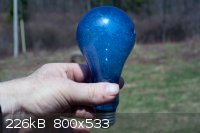 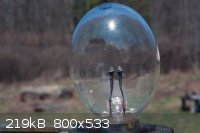
Trivia - Connection? The IRA stopped making bombs and
Polaroid stopped making film.
[Edited on 26-4-2011 by The WiZard is In]
|
|
|
The WiZard is In
International Hazard
    
Posts: 1617
Registered: 3-4-2010
Member Is Offline
Mood: No Mood
|
|
#3 (B) Flashbulbs
Stopped raining... so back from the acid storage. Walked up
on the first garter snake of the season, the maggots are at
work on my fisher (Martes pennanti) - it didn't look both
ways before crossing the road back in February. I hope it gave its
soul to God — for its bones are mine. Well except its missing
a rear leg.....
The metal mesh in #3 flashbulbs weighs on my reloading scale
0.30 gram's. It reacts vigorously with conc. HCl at ambient
temperature (15.5o C.) Most likely magnesium, however, could
be aluminium. Will sacrifice another and test it w/ NaOH.
Interesting - the bulb is coated on the outside like most
flash bulbs with plastic. These are also coated in the inside
with a thin plastic film. Could be all #3's are inside coated
the "B's" on the outside as that is were the Blue
for colour photography comes from.
|
|
|
a_bab
Hazard to Others
  
Posts: 458
Registered: 15-9-2002
Member Is Offline
Mood: Angry !!!!!111111...2?!
|
|
WiZ, the Zr flashlight bulbs are quite rare actually. They were among the first ones. Once it was discovered Al does the trick just as well, all the
rest were made with Al filament in an oxygen atmosfere. Mg was also used for a short period of time.
What you've got is likely Al. Do a sacrifice and grab your salad dressing for a quick test.
Some relevant links:
http://www.darklightimagery.net/flashbulbs.html (an introduction)
http://www.dlbrittain.com/FlashCollect.htm (metal use specification)
|
|
|
IndependentBoffin
Hazard to Others
  
Posts: 150
Registered: 15-4-2011
Member Is Offline
Mood: No Mood
|
|
Fleaker, I'll post a small sample of Zr to you for free to test whether it is suitable for your purposes. Please check your U2U's.
I can sell the following:
1) Various high purity non-ferrous metals - Ni, Co, Ta, Zr, Mo, Ti, Nb.
2) Alkex para-aramid Korean Kevlar analogue fabric (about 50% Du Pont's prices)
3) NdFeB magnets
4) High purity technical ceramics
|
|
|
| Pages:
1
2 |
|